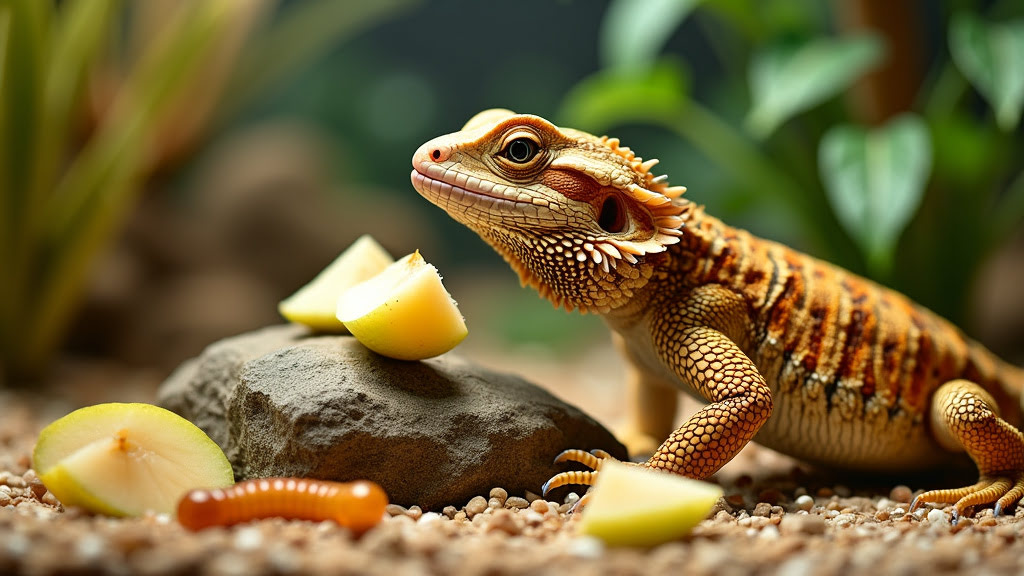Having a bearded dragon is like having a little dinosaur roaming your home. When I got my first bearded dragon, Spike, I was excited to discover how diverse and fun their diet could be. I quickly learned that a well-balanced diet is crucial for their health and happiness. Today, let’s answer a common question in the bearded dragon community: Can bearded dragons eat pears? Let’s find out if this fruit is good for them.
Understanding a Bearded Dragon’s Natural Diet
In the wild, bearded dragons eat a mix of insects and plants, depending on what’s available. They usually consume insects like crickets and mealworms, as well as various greens, fruits, and flowers.
Nutritional Needs of Bearded Dragons
Bearded dragons require a balanced diet with these key nutrients:
- Calcium: Important for bone health and proper growth.
- Protein: Vital for muscle development and overall growth, especially in young dragons.
- Vitamins and Minerals: Especially vitamins A and D3, which support vision and bone health.
Can Bearded Dragons Eat Pears?
Yes, bearded dragons can eat pears, but only in moderation. Pears have beneficial nutrients but also some aspects to be cautious about.
Nutritional Properties of Pears
Pears contain vitamins A, C, and K, as well as fibre, which can be good for your bearded dragon’s diet. However, they also have a high sugar content, which can lead to health problems if consumed too often.
Benefits of Feeding Pears to Your Bearded Dragon
Feeding pears to your bearded dragon can offer several benefits:
- Hydration: Pears have a high water content, which helps keep your dragon hydrated.
- Enrichment: Adding pears to your dragon’s diet can prevent boredom and offer a tasty treat.
When I first gave Spike a piece of pear, his reaction was priceless! He got super excited and started nibbling on it as if it was the best thing ever. Just a little bit of pear can make them very happy.
Risks of Feeding Too Many Pears
While pears have benefits, there are also risks if you overfeed them:
- High Sugar Content: Too much sugar can cause obesity and other health issues like fatty liver disease.
- Digestive Concerns: Eating too many pears can cause diarrhoea and stomach problems.
I learned the hard way not to give Spike too many pear pieces. One time, I gave him too much and he had a runny tummy. That was a smelly mistake!
How to Safely Feed Pears to Your Bearded Dragon
If you decide to give your bearded dragon pears, here’s how to do it safely:
Preparation Steps
- Washing: Wash the pear thoroughly to remove any pesticides or chemicals.
- Peeling: You can peel it if you’re worried about the skin.
- Cutting: Cut the pear into small, manageable pieces to prevent choking and make it easier for your dragon to eat.
Serving Size Recommendations
It’s crucial to keep the portions small and infrequent:
- Feed pears once a week as a treat.
- Offer no more than a few small pieces each time.
A little trick I’ve learned is to mix pears with other fruits like apples or blueberries. This keeps Spike curious and engaged during mealtime!
Alternatives to Pears: Other Safe Fruits and Vegetables
Suitable Fruits for Bearded Dragons
- Apples: A crunchy and tasty treat, just make sure to remove the seeds.
- Blueberries: Packed with antioxidants and easy to serve.
- Mangos: A sweet and juicy delight, though high in sugar so use sparingly.
Safe Vegetables for Bearded Dragons
- Collard Greens: Excellent source of calcium.
- Butternut Squash: Rich in vitamins and easy to digest.
- Bell Peppers: Great for adding a splash of colour and variety.
From my personal experience, Spike loves butternut squash. It’s hilarious to watch him go after it with such enthusiasm!
Monitoring Your Bearded Dragon’s Health
Keeping an eye on your bearded dragon’s health is key to spotting any dietary issues early on. Signs of a healthy bearded dragon include:
- Active Behaviour: They should be lively and keen to explore.
- Clear Eyes and Vibrant Skin: These are good indicators of overall health.
When to Consult a Vet
If your bearded dragon shows signs of dietary distress like persistent diarrhoea, lethargy, or lack of appetite, it’s time to contact a vet. Better safe than sorry!
Conclusion
To sum it up, can bearded dragons eat pears? Yes, but they should be given in moderation. As with any part of their diet, balance is key to keeping your bearded dragon healthy and happy.
Don’t be afraid to try different foods and see how your bearded dragon reacts. It’s a fun way to learn their preferences and keep their diet exciting. Just be careful, and you’ll both enjoy the journey.
Caring for a bearded dragon is a delightful blend of joy and responsibility. Spike has become a lovable part of my daily routine, and I’m sure your beardie brings just as much joy to your life. Happy feeding!
For a more detailed guide on the best diet for bearded dragons, you can check out our detailed information on the best diet for bearded dragons.

